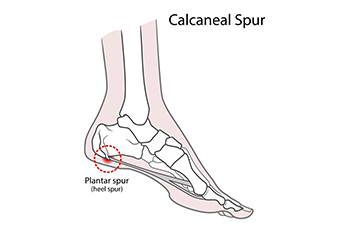



Heel spurs are common, yet often misunderstood, foot conditions that can cause significant discomfort and hinder daily activities. These bony growths develop on the underside of the heel bone and are often associated with plantar fasciitis. The most prevalent symptom of a heel spur is a sharp, stabbing pain in the heel, particularly when taking the first steps after periods of rest. Additionally, prolonged standing or walking can exacerbate the pain. A known cause of heel spurs is the repetitive strain on the plantar fascia, the thick band of tissue connecting the heel bone to the toes. Over time, this strain can lead to inflammation causing the formation of a heel spur. Contributing factors may include wearing improper footwear, obesity, excessive physical activity, or an abnormal foot structure. Early detection and proper treatment are essential for managing the symptoms and preventing further complications associated with heel spurs. If you have heel pain, it is suggested that you consult a podiatrist sooner rather than later for proper treatment techniques.
Heel spurs can be incredibly painful and sometimes may make you unable to participate in physical activities. To get medical care for your heel spurs, contact our podiatrist from Dr. Powers Foot and Ankle. Our doctor will do everything possible to treat your condition.
Heels Spurs
Heel spurs are formed by calcium deposits on the back of the foot where the heel is. This can also be caused by small fragments of bone breaking off one section of the foot, attaching onto the back of the foot. Heel spurs can also be bone growth on the back of the foot and may grow in the direction of the arch of the foot.
Older individuals usually suffer from heel spurs and pain sometimes intensifies with age. One of the main condition’s spurs are related to is plantar fasciitis.
Pain
The pain associated with spurs is often because of weight placed on the feet. When someone is walking, their entire weight is concentrated on the feet. Bone spurs then have the tendency to affect other bones and tissues around the foot. As the pain continues, the feet will become tender and sensitive over time.
Treatments
There are many ways to treat heel spurs. If one is suffering from heel spurs in conjunction with pain, there are several methods for healing. Medication, surgery, and herbal care are some options.
If you have any questions feel free to contact one of our offices located in Bloomington, Bedford, and Washington, IN . We offer the latest in diagnostic and treatment technology to meet your needs.